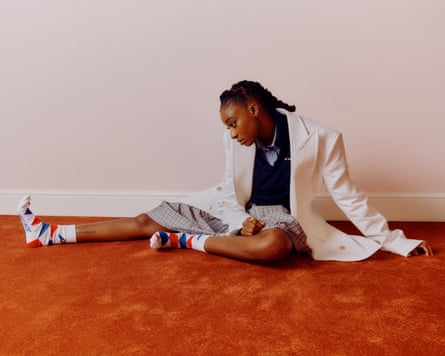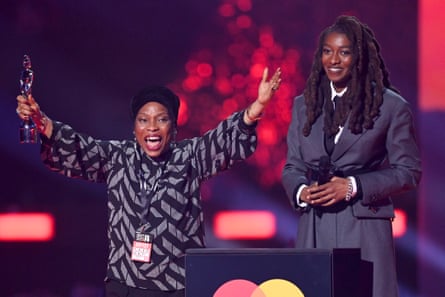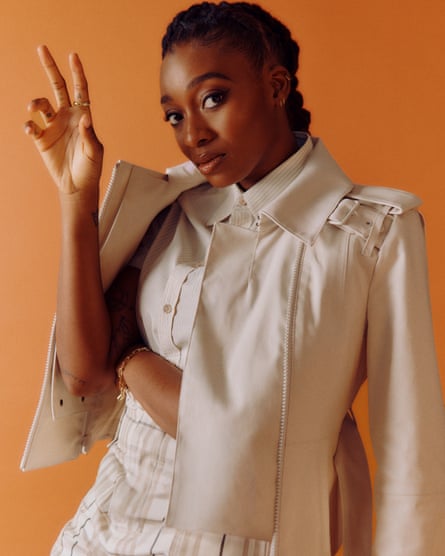It’s an unseasonably warm spring afternoon and sunlight is beaming through the floor-to-ceiling windows of a north London photo studio. When I arrive, Little Simz is out on the balcony. Wearing chunky sunglasses, a skirt and comfy cardigan, she sits on a chair with her back to the sun, eyes on the horizon, and pulls her legs up, wrapping her arms around her knees in a defensive position that’s verging on foetal.
It’s curious body language for an artist at the top of her game. At 31, Simz is looking out at a city she can justifiably claim to have conquered since emerging as a teenage rapper more than a decade ago. But that’s not where she’s at right now. “I genuinely felt like I could disappoint everyone,” Simz says when I ask about the making of her sixth album, Lotus. She gives an impression of what she said to her team at the start of the process. “Sorry, everyone, this could be a big waste of your time, and if it is, I’m truly sorry, but I’m just not confident right now.” The crisis felt terminal, Simz tells me.
It sprang from creative fatigue: six albums in a decade and relentless touring tends to do that to solo artists. That spark she naturally had in the studio just wasn’t there this time, perhaps exacerbated by a very public schism with her friend, collaborator and producer Inflo. They are now embroiled in a messy legal battle over an alleged £1.7m in unpaid loans. She’s explained the album title as a reference to “one of the only flowers that thrive in muddy waters”, but the seas she’s been swimming in appear shark infested rather than just murky.
She was close to calling it quits. At one point Simz sat down with Lotus producer Miles Clinton James to lay her cards on the table. “I was just real with him. I said, ‘Look, whatever you think this Little Simz shit is … I can’t guarantee that’s possible because I’m not even feeling it myself.’
“I just was a bit lost, to be honest,” Simz says.
The first time I saw Simz perform was 11 years ago in a dark basement club in east London. She was still a teenager, making her live debut as a support act for the Atlanta rapper Future – tall, skinny and absolutely not fazed by a crowd made up of industry types as well as hardcore rap fans. Contemporary hip-hop can sometimes seem like a game of style over substance – more about the number of followers, the degree of posturing and the right connections than actual ability on the mic. Simz is an antidote to those excesses. Watching her at Glastonbury last year, she appeared with a backing band and little else, dropping into a cappella moments where her voice and lyrical ability were the only tools she needed. But even then, in that little basement back in 2014, she looked born to do it.
Since that debut she has risen to become arguably the most exciting British musician of the last decade. There have been awards: a Mercury prize, an Ivor Novello, a Brit and a handful of Mobos. All of her albums have been critically praised, but the last three have cemented her as a mainstream success and darling of the critics. This year she’s curating Meltdown, following in the footsteps of Grace Jones, David Bowie and Chaka Khan, and bringing herself, plus The Streets and Tiwa Savage, to London’s Southbank Centre. She’s also shooting two films, both still under wraps. And there have been viral online moments, too: a Chicken Shop date with Amelia Dimoldenberg where she talked about her love of Bell Hooks and Muay Thai kickboxing; and a few weeks back she freestyled with Usher after one of his sold-out O2 shows.

What does she think young Simz would make of the artist she’s become today? “I think she’d just be proud,” she says, looking out over the London skyline. “Like, wow, you actually did it. You actually did what you set out to do.”
Did she have an established list of goals? “Definitely playing the O2,” she says after a moment’s thought. “Even though that’s not happened yet, it’s happening.” Simz is set to play the venue in October, as part of a UK arena tour in support of Lotus. “Even that is a crazy thing to wrap my head around,” she says. “Or even just, like, going to the States and performing in New York, or curating Meltdown. I don’t even think I knew what Meltdown was back then.”
Born Simbiatu Ajikawo in 1994, Little Simz was raised in north London by her Nigerian mother Tola and three older siblings. Her father broke up with her mum and left the family home, which soon buzzed with activity thanks to a steady stream of foster children. “I met so many different kids from all different walks of life who just became part of my family and who my mum nurtured and took care of,” Simz says. “It was really beautiful. I gained newfound respect and appreciation for my family, knowing that it’s not given that everyone has loving support … I never went a day without love.”
When Simz won a Brit for best new artist in 2022, she brought her mum out on stage. “It just really felt like she won best album that night and I just went up there to support her,” says Simz, who seems genuinely in awe of her mother. “I thought, wow, you came to this country not knowing anyone, not knowing a word of English, and now your last born has just won a Brit … it’s kind of crazy.”

Growing up in north London, Simz experimented with various artistic disciplines. She danced (the hyperactive early 00s style known as krumping was a favourite); acted (starring in CBBC shows Youngers and Spirit Warriors); and rapped, appearing on stage at the O2 Academy aged 11, reciting her own work as part of a youth club also attended by Leona Lewis and Alexandra Burke. The competing creative avenues were all maintained until she hit her mid-teens and a clear winner emerged.
“When I was maybe, like, 14 is when music became my world. I was just so immersed in it. This is me. This is what I want to be when I get older,” Simz says. The artists she most looked up to were Missy Elliott and Ms Dynamite. “Watching early Missy videos … the beats were hard, so I always wanted to dance to them and make routines for them.” But what really impressed Simz was her artistry and uncompromising approach. Told by executives she wasn’t thin enough, Elliott shot videos with Hype Williams in billowing black costumes that made a feature of her body type rather than diminishing it.
Simz has spoken before about industry figures encouraging her to wear sexualised outfits – something anathema to an artist whose lyrical ability is their superpower. “I don’t want to compromise on that, because at that point I’d stop being myself,” she says. “But maybe something that I wasn’t open to wearing when I was 18, I would now as a grown woman … It just has to feel right.”
Like her other hero, Ms Dynamite, Simz addressed the absence of her father in her lyrics. While Dynamite didn’t pull her punches (“I spent 23 years trying to be the fucking man you should be / Taking care of your responsibility / Putting clothes on our back and shoes on our feet, no help” is how she addressed it on her song Father), Simz is more reflective, generous even, in her assessment of her dad, who she still has no contact with.

She’s written about him before on I Love You, I Hate You, a standout moment from her Mercury prize-winning album from 2022, Sometimes I Might Be Introvert. Did his absence complicate her happy memories of childhood? “It doesn’t affect the memories I have growing up. It just wasn’t meant to be between them … but I think there’s still a lot of love there, and I’m sure my dad respects my mum having raised his children, you know? Now that I’m older, I definitely just understand that parents are flawed as well, and I get it. I’ve tried to not hold on to the anger, maybe that I once felt, or like this deep resentment … I’m just trying to let it go.” Was that hard to do? “Definitely, 100%,” Simz says. “Especially when you just internalise a lot of it. Like, did you not love me? Like, did you not …” There’s a pause. “I don’t think it’s any of that. I just think it is what it is, to be honest. But I’ve forgiven him.”
That grace isn’t something Simz extends to everyone. One issue that definitely isn’t resolved is her relationship with Inflo, real name Dean Josiah Cover, the producer she’s known since childhood and to whom she paid gushing tribute from the Mercury stage. (“I wanna say a thank you to my brother and close collaborator Inflo – Flo [has] known me since I was so young, he’s stuck by me, we created this album together. There were times in the studio I didn’t know if I was gonna finish this record, I was going through all the emotions … he stuck by me.”) The pair met at Mary’s Youth Club in north London and forged one of the most successful and close producer-artist relationships the UK has seen in the last decade. They didn’t just work on Little Simz records, they were also part of Sault – the mysterious collective that also includes Inflo’s wife Cleo Sol and Michael Kiwanuka. They didn’t play live. Albums were dropped without warning or promotion. They oscillated between R&B, neo-soul and funk, all underpinned by Inflo’s production, earning the group a Mercury nomination in 2021. But it’s fair to say that a lot has changed in the last three years. Lotus feels like a breakup record of a sort, not romantic but still deeply personal, as the Simz/Inflo partnership is pulled apart and dissected.
In late 2023, Sault put on a gig at the Drumsheds. It’s a huge venue in north-east London that used to be an old Ikea store, which they filled with string sections, choristers and teams of dancers. Tickets were priced at £99 a pop, and sold out rapidly. One punter said it was like a mix of Kendrick Lamar’s performance at Glastonbury, a Punchdrunk immersive theatre production, the London 2012 opening ceremony and Talking Heads’ classic concert film Stop Making Sense, “and it was also like nothing you’ve ever seen”. The whole thing cost around £1m, which Simz claims she mostly bankrolled, lending the money to Inflo. Simz’s legal team says she also made significant payments to her former producer to cover recording costs. Inflo’s legal team disputes the details of the claims but he is yet to comment publicly; the case is ongoing.
“Clarity” and “directness” are the two words Simz uses to sum up her mindset going into the recording process for Lotus. From the opening track Thief, it’s clear what she’s focusing on. There are barbs (“You talk about god when you have a god complex, when I think you’re the one who needs saving … ”), score settling (“We went for 100 down to nought, and yes it is all your fault … your name wasn’t popping until I worked with you”) and accusations (“This person I’ve known my whole life, coming like the devil in disguise. My jaw was on the floor, my eyes have never been so wide … ”). It’s all delivered with a snarl and a driving bassline that wouldn’t sound out of place on a Nick Cave murder ballad. Her track Lonely features the lines, “Team falling apart and I’m caught in the crossfire / You selling me lies and saying I must buy”; while on Hollow she raps, “You want the best for me allegedly / But all you got is evil eye and jealousy … You was moving like one leech.”
after newsletter promotion
Simz describes the schism as “a bit of a violent ending” and she doesn’t leave anything to the imagination on the record: there’s not an olive branch in sight. Although Inflo isn’t mentioned by name, it doesn’t take a forensic investigator to figure out who the chorus “Selling lies, selling dreams … Thief!” might be aimed at, while “I feel sorry for your wife” appears to be a reference to Inflo’s partner, Cleo Sol. These are Fleetwood Mac levels of animosity.
Surely there must be huge anxiety before airing all these things in public? “I really just put my life out there and my diary essentially,” she says, sounding like rap’s answer to Rachel Cusk.

“I just wanted to be true to the emotion, what I was feeling, and document it, and not shy away from how I feel about stuff, because I don’t want things to eat me up and fester.” She emphasises that the desire for openness is about her mental health. “Because I do think they eat you from the inside out. So for me to not let that happen, I needed to talk about it in so many different ways … from a place of pure hurt and anger and frustration, to a place of sadness.”
Simz has spoken before about her experiences with therapy, in order to cope with seeing friends go to prison, and after the 2018 murder of the model Harry Uzoka – another childhood friend, who was stabbed in west London. Simz stayed off social media in the hours after the news broke, instead choosing to go into the studio and write Wounds, an anti-knife crime track on her album Grey Area. Now it seems the place she’s working out her feelings is the recording studio. And she’s under no illusions that there’s a road back to working with Inflo or as part of Sault, who are still releasing new music (though the collective’s Michael Kiwanuka features on the title track, Lotus). “I’m really proud of myself that I was able to do that,” she says. “There’s a legacy built; amazing music was made and I will always love those songs. I’m super proud of that work, but it’s just a new time and a new chapter in my life.”
Can she still listen to the music she made with Inflo as a solo artist and in Sault? “If you have a kid with someone and it doesn’t work out, you don’t just stop loving the kid,” she says after a few moments. “You can appreciate you’ve made something beautiful with someone and now grow in your separate ways.”
Three things kept Simz grounded during the tumult of the last 18 months: family, God (she’s credited the big man with helping her get the album finished) and her partner, the model Chuck Junior Achike. You rarely hear Simz speak about her relationship: is that intentional? “I don’t think I get asked that much,” she laughs. “I do quite enjoy having that bit of privacy, but my partner’s not a secret.”
Then there’s her favouite way to relax: Lego. “I haven’t done it in a while, but at one point I was banging them out in a day … just ordering bare Lego, getting a bit crazy with it.” How crazy? Did you recreate Middle-earth in your living room? “I had one similar to this landscape,” she says looking out toward the Shard and the city skyline. “I think it was, like, the London Eye, and I set up some nice bonsai trees, flowers and a jazz band.” What’s the appeal? “It just makes me feel like a kid,” Simz says. “I’m not really thinking when I do it … it just feels really peaceful. I just feel really calm.”
Cooking for loved ones (she makes a mean plate of jollof rice) and entertaining is another key part of the Simz downtime calendar, as well as taking photographs. “Photography is something I’ve loved for many, many years,” Simz says, beaming. “I like just going out and shooting stuff.” Like what? “Landscape stuff, or people, whatever. If I’m out in the middle of nowhere, I’ll just shoot some sheep.”
“Sheep?”
“Yeah,” she says. “They need to be represented, too!”
We’ve swapped seats; she’s now looking out over the capital, sunglasses on to protect against the glare. Amid the jokes there’s a hard-won steeliness to Simz. Was it always there? Coming into the industry as a teenager, Simz says, she was “super trusting, very open, very vulnerable” and genuinely believed that people worked in the industry because they just love music. “That was my attitude towards things,” she says, laughing. “People are just trying to make good art, because music’s really gonna heal the world. Then obviously you get rude awakenings.”
Lanre Bakare is the author of We Were There: How Black culture, resistance and community shaped modern Britain, published by Vintage
Little Simz’s new album, Lotus, is out now and she is curating Meltdown, 12-22 June, at Southbank Centre, London.

 3 months ago
162
3 months ago
162

















































